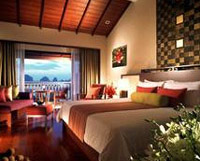
WORLDHOTELS, a worldwide hotel group for independent hotels and regional hotel brands, plans to grow its China member hotels from the existing 30 to 50 by the end of July in 2008, according to the company's Asia-Pacific executive.
"We want quality growth in China, and our major (business expansion) focus in the next two and a half years would be on China's secondary cities," said Roland Jegge, vice-president of WORLDHOTELS Asia-Pacific region.
Currently the company's Chinese member hotels are mainly located in the nation's major cities, with six in Beijing, six in Shanghai and seven in Hong Kong.
"We would expand to cities like Guangzhou, Xiamen and Shenzhen," Jegge said.
Founded in 1970, WORLDHOTELS provides hospitality services including sales, marketing and distribution to 500 member properties in 70 countries worldwide.
Throughout the Asia-Pacific, the company has 70 member hotels. China accounts for 43 percent with 30 hotels having joined the group since it took on its first Chinese member in 1993.
"China is our biggest market across Asia, it's fantastic," Jegge said. "And it is also the most rapidly growing market as well."
In 2005, hotel room bookings through the company's central reservations system (CRS) from Greater China, including Hong Kong, increased 20 percent.
Unlike international hotel groups such as Marriott and Hilton, which mainly offer hotel management expertise and provide global networking to their local hotel partners, WORLDHOTELS offers its Chinese member hotels more flexibility and focuses on properties with character and distinction, Jegge said.
"They have to sign a 20 to 30-year-long contract with Hilton or Marriott. But for those joining in WORLDHOTELS, five or six years is OK," he said.
The firm's Chinese member hotels can also retain their independence, while being able to make use of the collective strength of its global sales, marketing and related services.
"Guests get a different experience in each of our member hotels here, but the international hotel management companies want to design themselves, making all hotels the same around the world," he said.
"Given its targeted niche market, the WORLDHOTELS business model should be more popular in China, as more Chinese hotels want to be the masters of themselves," said David Zhong, publisher with www.micechina.com.
But there are still challenges to be faced by the group, Jegge said.
While its member hotels enjoy a good reputation among Chinese customers such as Kunlun Hotel Beijing, WORLDHOTELS is not yet well-known.
"We will try to provide customers with more access to us, and help them recognize us," Jegge said. "But quality is still more important as it can both bring us up and bring us down."
This July, the company will kick off a quality assurance programme among its China members, which it began last year in Europe.
(Xinhua News Agency June 7, 2006)
|

